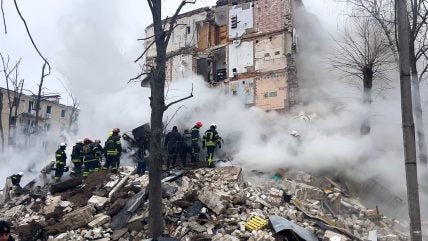
Estonia urged defence ministers to let Ukraine strike Russian airbases on Russian sovereign territory, during a meeting of the Ukraine Defence Contact Group held on 6 September 2024, at Ramstein Air Base.
As Ukraine continues to withstand Russian aggression, Estonian Defence Minister Hanno Pevkur issued a call to allow Ukraine greater freedom in prosecuting the war.
The meeting of the Ukraine Contact Group, held over the course of two days, convened key defence ministers to address the state of the battlefield, Ukraine’s evolving military requirements, and the ongoing flow of international aid.
Pevkur used the occasion to reinforce Estonia’s long-standing stance on Ukraine’s defence, underscoring the importance of swift action.
“Estonia’s position has been and remains very clear: we must give Ukraine everything it needs and quickly so that they can win the war and push the enemy out of their territory,” said Pevkur in a statement that left no room for ambiguity. He pointed to the devastating Russian attacks on civilian infrastructure and residential areas as evidence of Moscow’s desperation and disregard for civilian lives.
“Russia is also massively attacking critical infrastructure to leave people without heat and electricity for the winter,” he continued, highlighting the broader humanitarian impact of the war. “Ukrainians know where these strikes are coming from, but those points are currently out of their reach. Therefore, let Ukraine strike back at these air bases to eliminate the sources of attacks and save lives.”
Pevkur’s reference to Ukrainian military successes in Kursk signals a growing belief among some European nations that the country has the capability to push further into Russian-held territory. “The Ukrainian success in Kursk has shown that Russia cannot control what happens on its own territory,” he said, adding, “Russia is provoked by fear and weakness – when met with a show of strength, they will crumble.”
The remarks came as Pevkur met bilaterally with Ukraine’s Defence Minister, Rustem Umerov. The two ministers reviewed Estonia’s latest aid shipment to Ukraine and discussed the country’s immediate military needs. Pevkur outlined Estonia’s continued commitment, reaffirming his country’s pledge to contribute 0.25% of its GDP annually to Ukraine’s defence efforts—a contribution, he noted, that Estonia has already surpassed with its latest delivery of Mistral short-range air defence missile systems.
“We will continue our efforts, and as soon as we receive feedback from Ukraine on their needs that the Estonian defence industry can meet, we will immediately proceed with procurement to ensure that this aid reaches Ukraine’s defenders as quickly as possible,” Pevkur assured.
At a meeting of capability coalitions’ lead nations, Estonia was represented by Tuuli Duneton, Undersecretary for Defence Policy. Duneton co-chairs the IT Coalition steering group alongside Luxembourg, a project initiated at the September 2023 meeting of the Ukraine Defence Contact Group.
The coalition, comprising 13 nations with Spain being the latest to join, is focused on bolstering Ukraine’s IT infrastructure, a critical component of modern warfare. “We have raised nearly €70m ($77m) in financial contributions and received €90m in material donations, amounting to a total of €160m in support,” Duneton revealed. The IT Coalition’s support is key to ensuring that Ukraine’s armed forces operate with secure, NATO-standard communications systems—an increasingly vital requirement as the war drags on.
“Several deliveries have already reached Ukraine and are in use on the battlefield,” Duneton confirmed, underscoring the coalition’s rapid mobilisation and tangible impact on Ukraine’s defence capabilities.




